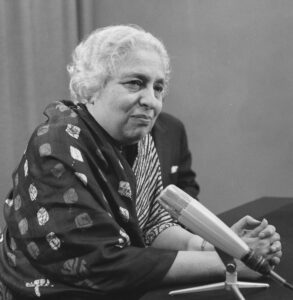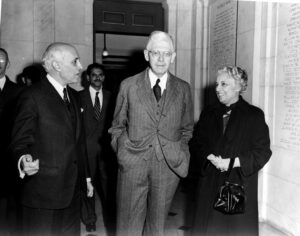Vijaya Lakshmi Pandit
From Indian Independence to Global Politics
“We do not subscribe to the widely-held belief that the affairs of nations can be successfully conducted on a military level. In the world’s recent history there is abundant evidence to prove that neither threats of superior force nor displays of armed might have been able to create the climate in which peace can take root. The great malady which affects humanity today is fear, born of tensions following the armaments race. Fear is a bad counsellor and reduces those who fall within its grasp to a state in which no positive action is possible.”1)
With these timeless lines, the famous diplomat, politician and Indian freedom fighter Vijaya Lakshmi Pandit (née Swarupa Kumari Nehru) described India’s outlook on foreign policy during the 20th century. Her role in international politics and relations as well as in shaping the development of the United Nations is often overshadowed by her familial ties to her brother Jawharlal Nehru, the first president of independent post-colonial India, and Mahatma Ghandi, with whom she fought for an Indian state free from British imperial rule.

© Kroon, Ron
Vijaya Lakshmi Pandit during a visit to the Netherlands in 1965
The early years in colonial India
Vijaya Lakshmi Pandit was born as Swarupa Kumari Nehru in the city of Allahābād, India, on August 18th 1900 into a wealthy Kashmiri family. Her father, Motilal Pandit – a successful Oxford-educated lawyer, politician and Ghandian nationalist – put particular emphasis on ensuring that Pandit would become the educated woman needed by the Indian nationalist movement at the time.2) She became literate in English before she learned how to read and write Hindi and was home-schooled by an English governess and tutors, in line with the Western way of life only accessible to the privileged classes in Colonial India.3) Motilal Pandit believed that Indians, in the 20th-century world order, had to become English people if they wanted to succeed globally.4)
Vijaya Lakshmi Pandit’s fluent command of the English language alongside her Anglophile education certainly paved the way for her later career in international relations.
In 1921, she married lawyer Ranjit Sitaram Pandit. His family picked the name Vijaya Lakshmi Pandit for her, replacing her birthname Swarupa Kumari Nehru; a procedure customary in Hindu circles at the time.5) They had three daughters before Ranjit Pandit passed away in 1944 while serving a prison sentence for his acts of civil disobedience against British imperial rule. As they had no sons and Ranjit left no will guaranteeing her a share of his inheritance, Hindu communal law transferred the family’s money and property to the closest male relative in her husband’s family.6) Pandit was offered minimal widow maintenance alongside payments for their daughters until they were married by the Pandit family. She accepted this offer, relying on the support of her brother Nehru – who was himself serving a prison sentence for his nationalist activism – and Mahatma Ghandi, who urged her not to pursue a legal case against her in-laws as they ‘had more important things to do’ in pursuit of an independent post-colonial India.7)
Pandit’s contribution to the fight against British colonialism and securing Indian independence
Alongside her male relatives Vijaya Lakshmi Pandit herself became a prominent figure in the fight against the British colonial rule in India. She followed the Ghandian line of Indian nationalism and was imprisoned three times following acts of civil disobedience such as sit-ins.8) In the Nehru family, challenging British imperialism became a family affair – Pandit served her final prison sentence in India in 1942 alongside her then 20-year-old daughter.9)
Following her national activism, Pandit was approached by Sir Tej Bahadur Sapru, then President of the Indian Council for World Affairs, to speak on behalf of India to the United States. To assert control over her following her civil disobedience, the British had confiscated Pandit’s passport to heavily restrict her international mobility. However, after meeting the chief of the Allied Air Command in the Eastern region at a consulate dinner, Pandit secured a US visa and arrived in the United States aboard a US army plane in 1944.10)
In the United States, Pandit attended an Allied-led conference in Virginia on post-war developments in Asia as a member of an Indian observer delegation. The following year, she used every opportunity to demand Indian independence and called for an indictment of the colonial system, especially in lectures all over the country.11) She attended the United Nations Conference in International Organization in San Francisco in 1945 as an unofficial representative of India (which was officially represented by three cabinet members of the British Indian government). There, she emphasised the historic importance of the UN’s stance on colonialism and imperialism – challenging the very principles of the nascent organisation.12)
Representing a newly independent nation
When India finally gained independence in 1947, Pandit’s brother Nehru became the first Indian prime minister. Having proved herself on the international stage campaigning for Indian Independence in the United States, Pandit was sent to the USSR as the first ambassador for India (1947 – 49), followed by postings to the United States, Mexico, Spain and as High Commissioner to the United Kingdom.13)

© Photo Division, Ministry of Information & Broadcasting, Government of India
Independent India’s first prime minister Jawaharlal Nehru, President of Princeton University Prof. Harold Dodds and Vijaya Lakshmi Pandit as Indian Ambassador to the United States in 1949
A first in history
In 1953, Pandit was elected President of the UN General Assembly for the eighth session. She was the first woman to be elected as president of the Assembly and remains the only Indian person to hold this position to this day.
Pandit continued to use her voice in the United Nations to draw attention to ongoing colonialism worldwide and to demand equal rights and freedom for the oppressed everywhere. In a speech at a UN plenary meeting in 1948, she stated that the
“Indian delegation, believing in the freedom of all peoples, wished to see the early termination of colonial system, and the speedy attainment of self government by all peoples inhabiting colonial or Trust Territories. It insisted on the strict observance of Chapters XI and XII [of the UN Charter], both in spirit and letter. In particular, it urged the colonial Powers to realize that the two hundred million people inhabiting the Non-Self-Governing Territories read into the provisions of the Charter relating to such territories far more than the colonial Powers were inclined to do so.”14)
Her passionate commitment to human rights all over the world made her a commendable Indian representative to the UN Human Rights Commission in the later years of her life in 1979.
Legacy
After her diplomatic career, Pandit continued to serve the Indian people as a national politician. She died in 1990. Despite her challenges as both Indian and a woman in the Western and male-dominated international arena during the first half of the 20th century15), Pandit set the tone against colonialism in the newly established United Nations. In India, she is fondly remembered for her courageous stance against British colonialism.
Further sources:
- Lecture by Prof. Manu Bhagavan on his book ‘Vijaya Lakshmi Pandit’ at the Asian American / Asian Research Institute – City University of New York on October 4, 2024
- ‘The Scope of Happiness – A Personal Memoir’ by Vijaya Lakshmi Pandit, Crown Publishers 1979
- ‘Vijaya Lakshmi Pandit – A Biography’ by Prof. Manu Bhagavan, Penguin 2023
References
| ↑1 | “India’s Foreign Policy” by Vijaya Lakshmi Pandit in Foreign Affairs Vol. 34, No. 3, Council on Foreign Relations April 1956, p. 436. |
|---|---|
| ↑2 | “The Woman Who Swayed America: Vijaya Lakshmi Pandit, 1945” by Julie Laut, DEP n. 37 / 2018, Università Ca‘ Foscari Venezia, p. 29. |
| ↑3 | “Woman of the World“ by Pearl S. Buck, United Nations World vol. 1 no. 2, 1947, p. 25. |
| ↑4 | “Sunlight Surround You; A Birthday Bouquet from Chandralekha Mehta, Nayantara Sahgal and Rita Dar” by Sri Prakasa, Orient Longmans, 1970, p. 24. |
| ↑5 | “Envoy Extraordinary – A Study of Vijaya Lakshmi Pandit and her Contribution to Modern India” by Vera Brittain, George Allen & Unwin Ltd., 1965; p. 41. |
| ↑6 | “India and the Quest for One World – The Peacemakers” by Prof. Manu Bhagavan, Palgrave Macmillan 2013, pp. 17 f. |
| ↑7 | “The Scope of Happiness – A Personal Memoir” by Vijaya Lakshmi Pandit, Crown Publishers 1979, p. 181. |
| ↑8 | “Indian Women in Freedom Struggle” by Dr. Kamlakar Suryawanshi in Special Issue No. 122 “Contribution of Women in Indian Freedom Struggle”, Aayushi – International Interdisciplinary Research Journal (AIIRJ) March 2023, p. 78. |
| ↑9 | “The Woman Who Swayed America: Vijaya Lakshmi Pandit, 1945” by Julie Laut, DEP n. 37 / 2018, Università Ca‘ Foscari Venezia, p. 27. |
| ↑10 | “The Woman Who Swayed America: Vijaya Lakshmi Pandit, 1945” by Julie Laut, DEP n. 37 / 2018, Università Ca‘ Foscari Venezia, p. 31. |
| ↑11 | “A New Hope: India, the United Nations and the Making of the Universal Declaration of Human Rights” by Manu Bhagavan, Modern Asian Studies Vol. 44, No. 2, Cambridge University Press March 2010, p. 315. |
| ↑12 | “India and the Quest for One World – The Peacemakers” by Prof. Manu Bhagavan, Palgrave Macmillan 2013, p. 52; “Portraits of Women in International Law” by Parvathi Menon, edited by Immi Tallgren, Oxford University Press 2023, p. 244. |
| ↑13 | “The Woman Who Swayed America: Vijaya Lakshmi Pandit, 1945” by Julie Laut, DEP n. 37 / 2018, Università Ca‘ Foscari Venezia, p. 27. |
| ↑14 | Summary of Pandit’s remarks before the 143rd UN Plenary Meeting, 25 January 1948, in „India at the United Nations“ by S. K. Madhavan, APH Pub. Corp. 1999, Vol. 1 p. 22. |
| ↑15 | “The Woman Who Swayed America: Vijaya Lakshmi Pandit, 1945” by Julie Laut, DEP n. 37 / 2018, Università Ca‘ Foscari Venezia, p. 44. |




I would like to correct you: India’s first Prime Minister was Jawaharlal Nehru, and the first President of India was Dr. Rajendra Prasad.